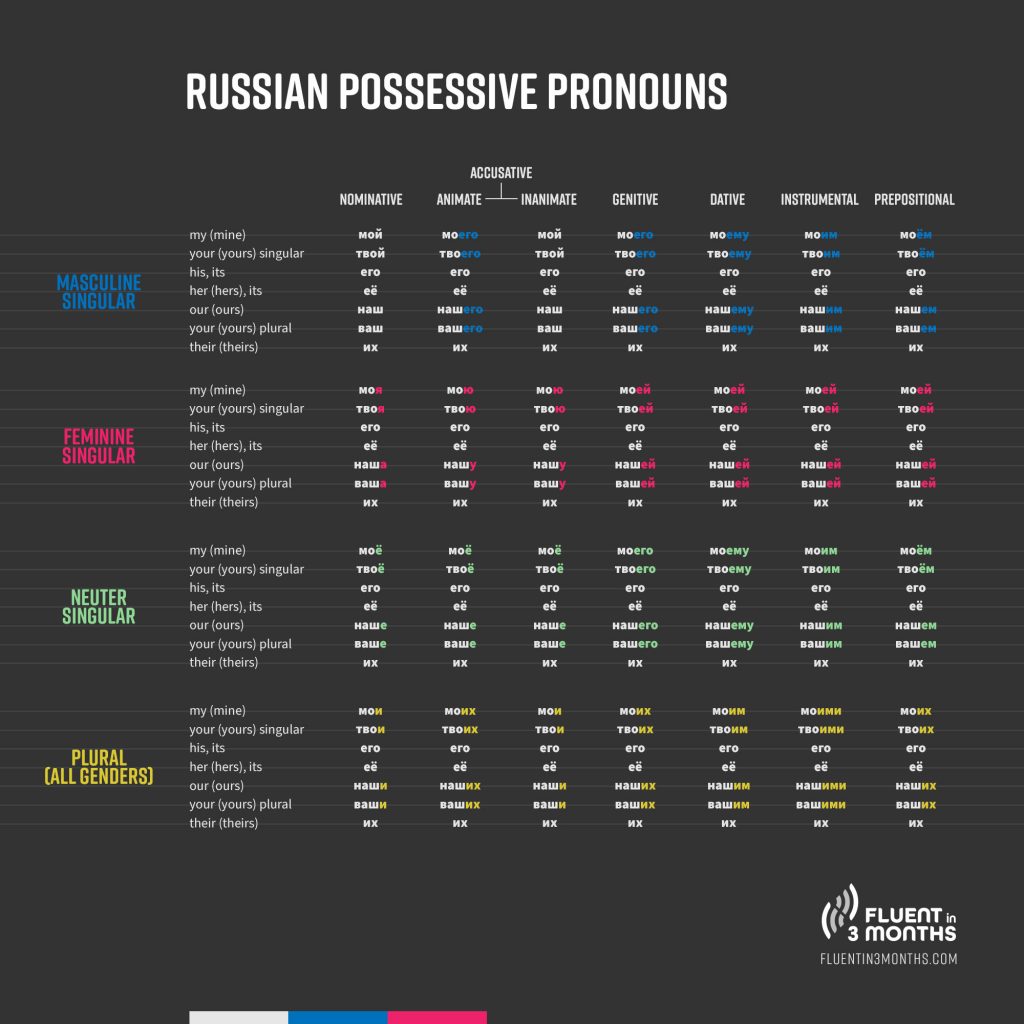How Long Does It Take To Learn Conversational Japanese
How to Larn Russian – It's Easier Than You Think!
Learning Russian has changed my life, and I believe it can modify yours besides – if you are open up to it.
Russia evokes powerful emotions in all of united states. Information technology's nigh impossible to feel indifferent towards information technology: you either love it or detest it.
Having hosted the FIFA World Loving cup in 2018, and in a delicate political situation with Ukraine, it is clear that Russia isn't going away someday presently, like it, or not. And all the same, despite its international prowess, there is often a lack of interest in wanting to understand Russia, its civilization, its people, and its language.
And that'south a shame.
I studied Russian for 4 years in college. I studied abroad there for a semester, worked a summertime in Moscow, and take traveled there on several occasions equally a tourist. My girlfriend of many years is Russian.

In this postal service, I'll give you a few tips on how to learn Russian. Here's what we'll cover:
Table of contents
- Hacking The Linguistic communication: How to Learn Russian and Why It Isn't As Difficult As You Think
- Beginning With the Russian Alphabet
- Spot the Adaptations From English
- Work With the Immense Flexibility of Judgement Structure
- Acquire the Many Russian Rules, Merely Face Few Exceptions
- Why Russian Should Be Your Side by side Language Of Choice
- Travel To Russia And The Eastern Bloc
- Expectations For Westerners Are Low
- Understand And Partake In Customs
- Arable Resource and Interest
- You Will Understand Your Ain Language Better
- Start Learning Russian Now
Hacking The Language: How to Learn Russian and Why It Isn't As Hard As Yous Think
I'd be lying if I said Russian was easy.
After many years of studying and interacting with Russians, I still consider myself to be only conversational. Verbs of move, verbal attribute, and completely unpredictable verb/preposition pairs will make your caput spin.
However, I checked several articles effectually the topic of "hardest languages for English Speakers". I'm happy to say that Russian didn't appear in the top x for any of them. It's nonetheless considered easier than Arabic, Chinese, Japanese, and Korean.
So let'due south focus on some of the bright sides of learning Russian.
Outset With the Russian Alphabet
One of the showtime things that turn people off from a new language is having to learn a different gear up of characters or messages.
People vastly overestimate how difficult this really is. They meet the astern "R" (я pronounced [ja]) and immediately desire to turn the other style.
Benny Lewis, founder of Fluent in 3 Months, has written extensively about why Chinese is not as difficult equally it seems. He points out in particular that the number of characters in the linguistic communication should non be seen every bit a huge obstacle.
If that'southward true for Chinese, which has thousands of characters, it should certainly exist true for Russian, which has just 33 messages.
Remember: it may exist Cyrillic, but it is nevertheless an alphabet. And alphabets are made upwardly of letters, just like English. But what makes it even easier than English is that these letters have consistent pronunciation. E'er try to say this poem in English aloud? So you lot'll know how welcome a consistently pronounced alphabet is!
While Russian tends to have longer words than English, as well as some tricky sounds, at least information technology doesn't take this trouble of sometimes needing to guess how a word is pronounced, like in English language. Can you imagine?
You pronounce information technology like it's spelled and you spell information technology like it's pronounced. That'southward the way it should be!
Honestly, you could learn Cyrillic in a day. You may make a few mistakes here and there with a few tricky letters that pose as English letters. Merely later a few weeks, you'll have information technology downward pat and you'll never take to think almost it again. Promise.
In fact, there are several letters in Cyrillic that are exactly like their English counterparts in look and pronunciation: A, B, D, K, 50, M, O, T. A
And many of the other ones have the aforementioned pronunciation, they just look a little funny. For case г is "m" and ф is "f".
All and all, there are actually merely a few new sounds that need to be learned.
Additionally, I find the Cyrillic alphabet to exist visually distinct. It however has that indigestible look that English has where, at to the lowest degree to me, each letter of the alphabet looks relatively unlike from the other. I don't feel that every bit much with say, Arabic, which looks very curvy.
All of this volition assist expedite the memorization stage.
Spot the Adaptations From English
Romance languages are non the only ones to have adopted words from the English language language (known as cognates). Russian has plenty as well. You just wouldn't know it considering it looks different in Cyrillic.
For case, Russian has its own give-and-take for md: врач (pronounced vrach). But you could only as hands say доктор ("medico"), and that would exist completely normal.
Additionally, there is a whole class of verbs that pretty much have just been Russified from English:
- парковать (parkovat) – "to park"
- адаптировать (adaptirovat) – "to adapt"
- адоптировать (adoptirovat) – "to adopt"
This may non be the case for all 'ова' verbs, but there is plenty to help you out.
In fact, more and more English words are finding their style into Russian considering of Western media as well as technology-based words. These seem to be adopted about with a general agreement across various languages.
For example "figurer", "microchip", "camera", and "tv" are all pretty recognizable in Russian.
Work With the Immense Flexibility of Sentence Structure
Ane of the things I realized about English AFTER learning Russian was simply how rigid the sentence construction is. At that place'southward a right way to say something.
For example, if you want to say that you lot are going to the park, you would probably say, I am going to the park. You wouldn't say, to the park, I get.
Unless you lot want to sound like Chief Yoda.
Russian isn't like that. I could translate that judgement in a variety of ways, such equally:
- я иду в парк – "I am going to the park"
- в парк иду – "to the park I go" (without the subject)
- в парк я иду – "to the park I go" (with the subject)
Did yous notice how in the second variant I left out the bailiwick? In English, we almost always include the pronoun, partly because we don't have a unique conjugation for each conjugation person. In "I go to the park" and "They get to the park", the verb class is the same.
Considering Russian has a defined conjugation for every pronoun, you don't need to include pronouns in sentences.
Acquire the Many Russian Rules, Merely Face up Few Exceptions
1 of the aspects of Russian that appeals to me the most is that it's a very rule-based language. I was a Math major, and then I cling to repeatable procedures and a ready of defined rules that I can wrap my head around.
This was one of my major turn-offs in loftier school when I was learning French.
For case, in French, you accept to memorize the gender for each individual word. Certain, there are tendencies for things to be masculine or feminine, but in full general, it's non scalable. This creates additional annoyances when you add adjectives and possessive pronouns. They also require agreement, stemming from the noun.
Russian isn't like that.
There is a set dominion for what is masculine, feminine, and neuter (neutral third case), with about no exceptions.
Rules for determining if a noun is masculine or feminine in Russian:
- Expect at the last letter of the word:
- If information technology is a consonant, or "й", the give-and-take is masculine.
- If it is "а" or "я" it is feminine.
- If information technology is "о" or "е" information technology is neuter.
- If information technology is a soft sign "ь" and then information technology could be either masculine or feminine. (relative to the above 4, this doesn't happen also ofttimes)
In that location are very few exceptions to these rules, just there are five notable ones that occur mainly because of concrete gender.
- Папа – "daddy, papa" → masculine
- Дядя – "uncle" → masculine
- Дедушка – "grandfather" → masculine
- Мужчина – "man" → masculine
- Кофе – "coffee" → masculine
And gender is just an example. This carries over to how verbs alter in the past and future tense, how nouns become plural, etc.
Rules, rules, rules.
For case, while it doesn't make much sense that "mouse" becomes "mice" in the English language plural, Russian has these rules in the nominative case:
For masculine nouns:
- If the word ends in a consonant, add together ы.
- Replace й with и
- Supervene upon ь with и
For feminine nouns:
- Replace я with и
- Supervene upon ь with и
- Replace а with ы (unless previous consonant is Г, К, Х, Ж, Ч, Ш, Щ. And then replace it with и as per the spelling rules.)
For neuter nouns:
- Replace o with а
- Supercede e with "я" (don't forget the spelling rules)
Examples:
- студент ("student") – студенты ("students")
- газета ("newspaper") – газеты ("newspapers")
- здание ("building") – здания ("buildings")
I discover this much meliorate than the randomness of English and romance languages.
The problem with Russian is that it has six declensions: Nominative, Accusative, Prepositional, Genitive, Dative, and Instrumental. If you've ever studied Latin, High german or some other Slavic linguistic communication y'all're probably familiar with these.
And they kind of stink, and lead to tables like this:

This is pretty nasty looking, I know. My statement isn't that information technology's easy, but that it'south reliable.
It too helps us pause down the judgement structure and see how words relate to each other. It's because of these declensions that we can organize the judgement a bunch of unlike ways and however distinguish between the discipline, the verb, and the direct object.
Why Russian Should Be Your Next Linguistic communication Of Choice
In Russia, English can't be your fallback.
Ever wonder why Russians seem to always visit the same countries and do and so as role of large, Russian-speaking tour groups?
It'southward often because they are non comfy speaking and traveling in English language.
If you become to the list of countries by English language speaking population and sort it, y'all will find Russia most the very bottom. Only 5.5% of the Russian population claims English equally a first or 2nd language.
Westerners tend to gravitate towards other Western languages like French and Spanish due to their familiarity. But a much larger proportion of people in those countries can at least communicate in English if need be.
In Russia, however, you have over 140 1000000 people that downright will not understand yous if you lot don't speak a little Russian.
That'due south a lot of people we can meet with i language.
Travel To Russia And The Eastern Bloc

Russia is a country rich in history, culture, and traditions.
But too oftentimes we don't even consider it equally a travel destination because we're intimidated by the linguistic communication and people. Russia gets about one-half the tourists that Spain and Italy become, and only one-third of what French republic gets.
It'southward true that traveling in Russia tin can be quite difficult on account of the Cyrillic alphabet, visa restrictions, and the lack of English speakers.
But consider what bucket-list worthy items we're missing out on if we don't even endeavor:
- Travel on the Trans-Siberian Railway
- Visit Red Square and Saint Basil'south Cathedral and other cute attractions in Moscow
- Picket The Nutcracker in a Russian theater
- Buy original Matryoshka dolls
Couple that with the fact that Russian opens doors to communicating with people in the Eastern bloc and you've got a globe of opportunities. I've gotten by with Russian in Poland and the Czech-Republic.
Expectations For Westerners Are Low
The cracking news about learning Russian is that people will love you even if yous only know a little bit. And so few Westerners even attempt to learn the linguistic communication that it's refreshing when someone shows initiative.
And Russians are not shy, as I notice nigh Asian cultures to be. They tin be quite chatty even, once they get to know you.
My Russian has been at all sorts of levels. When I was merely starting out, I only knew a few words. Now I am skillful in everyday conversation,only I can tell y'all that never once did anyone turn their back on me because of my level in Russian.
Empathise And Partake In Customs
Westerners, unfortunately, oftentimes harbor the opinions that Russians are cold, crude, and unpleasant. While information technology is truthful that Russians can be a little rough around the edges at times, in one case you lot break through this hardened exterior they are warm, welcoming, and hospitable.
It also just and so happens that Russia is filled with confusing customs, traditions, and superstitions that tin befuddle a Westerner.
As Benny Lewis, Founder of Fluent in three Months, tin adjure to, the best manner to understand a culture is through its language.
Had I non learned Russian I would accept been excluded from the vast majority of these customs, and probable would have just sat on the sidelines.
Instead, I take been able to be active in these various traditions, similar giving a meaningful toast at a reception or singing a song in a group. At the fourth dimension, these seemed somewhat trivial, just I realize at present how of import they were in edifice the foundations of a human relationship with strangers.
Abundant Resources and Interest
Russian may be a circuitous and intimidating language, merely in that location are enough of resources to assistance y'all on your way. Russian federation has a population of over 140 million and at that place are another 27 million living abroad. A large proportion of them are interested in learning English and engaging with English speakers.
Russians love Western civilization, and they do learn English language in school. They just don't employ it frequently.
Although I went to higher for Applied Math, I probably spent the bulk of my time chatting with Russians. I connected with them on social search sites like italki and Scrabbin.
I would study sites like RussianForFree.com. Youtube has a nice selection of videos with subtitles. I'm particularly addicted of cartoons for beginners.
You can find more free resources to acquire Russian in this post.
You Will Understand Your Own Language Better
Maybe my most unexpected benefit from learning Russian is how much it has deepened my understanding of my own language.
I never really approached English language from a linguistics perspective. As a result, I never actually appreciated the various constructions that make English language different.
When you start learning Russian, you really have to swoop into the grammer and the rules. This opens up a number of parallels to English that I never knew before. For example, English sentences have an social club that's completely different from Russian sentences, and still convey the aforementioned significant.
I would even say my French got better every bit well, just by learning Russian. Grammar finally started to make sense.
Commencement Learning Russian Now
Russian is a commitment. Even the most talented language learners volition probably struggle for months or years before they actually crevice it. However, it brings with information technology a world of opportunities in terms of people to meet, places to become, and experiences to take.
If I have convinced you to accept on the language, merely yous're non sure where to start, give a look at Benny's favourite resources to learn Russian!
Or, if you are Russian, давайте говорить по-русски ("permit's speak Russian")!
Original article past David Schneider, updated by the Fluent in iii Months team.

Source: https://www.fluentin3months.com/learn-russian/
Posted by: brownpiten2002.blogspot.com


0 Response to "How Long Does It Take To Learn Conversational Japanese"
Post a Comment